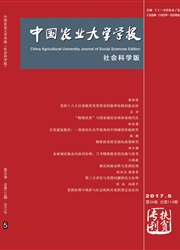

 中文摘要:
中文摘要:
农民对土地权属的认定及其理由与法定产权存在差异,这种差异虽然体现了农民的利益诉求,但其背后深层诱因更值得深思:农民对确权文本和相关法规进行了有利于自身的解释,实现了自身的产权建构.继而从更深层观之,农民的产权认知则成为产权建构的社会文化基础.这是农民在土地利用中的约定俗成和历史延续中塑成的,并与现行法律法规存在一定冲突.不过,农民并未完全排斥国家法与确权文件,而是将其与地方性知识共同作为获取利益的工具.农村土地制度的实施与改革必须要充分考量农民的生活实践.
 英文摘要:
英文摘要:
This article studies the local practical logic of farmland property right byanalyzing controversy in the farmland right confirmation . The authors found that peasants' cognition of farmland property right is different from legal property right. Although this difference embodies peasants' interests demands, it is worth considering: peasants interpret the thetext of property right confirmation and related laws in the way of beneficial to themselves, which can be used to construct the property right. Furthermore, we found in a more profound way that cognition of property right is the social and cultural foundation in the of property right construction. It is shaped by some customs and historical continuation in peasants' land- use, which is conflict to current laws and regulations. However, peasants don' t reject national law and the text of property right confirmation, which are used to be tools of profiting. It means that we should fully consider the peasants' life practice in the implementation and reformation of rural land system.
 同期刊论文项目
同期刊论文项目
 同项目期刊论文
同项目期刊论文
 期刊信息
期刊信息
